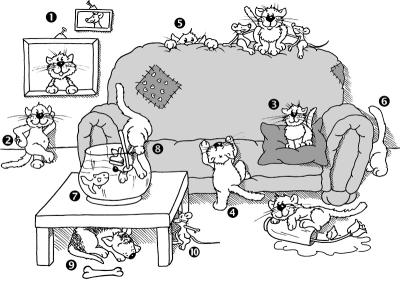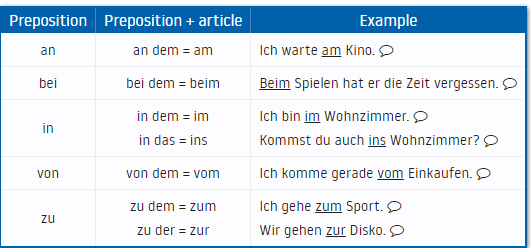Prepositions in German Grammar
German Grammar in Use

As a learner of German Grammar, it’s very important to know everything about prepositions. so what are they in German Grammar?
What are prepositions?
Prepositions (die Präpositionen) in German Grammar are small words that link nouns and pronouns to other words. They give us information about place (hinter, in …), time (bis, nach …), manner (ohne, mit …), and cause, reason or purpose (aufgrund, bezüglich …).
Prepositions that take the genitive
The following prepositions take the genitive case:
- aufgrund/auf Grund, wegen
Example: Aufgrund/Wegen der Hitze, fiel der Unterricht aus.
- trotz, ungeachtet
Example: Das Flugzeug startete trotzt/ungeachtet aller Warnungen.
- anstelle/an Stelle, statt
Example: Anstelle eines Badeurlaubs machten sie Urlaub in den Bergen.
- beiderseits, diesseits, jenseits, abseits, entlang, oberhalb, unterhalb, außerhalb, innerhalb, längs, seitlich
Example: Entlang/Diesseits des Flusses stehen Bäume.
- links, rechts, nördlich, östlich, südlich, westlich, unweit, weitab
Example: Er wohnt östlich der Grenze.
- abzüglich, zuzüglich
Example: Der Preis versteht sich abzüglich des vereinbarten Rabatts, zuzüglich anfallender Transportkosten.
- anhand
Example: Anhand der Grafik erklärte sie die Entwicklung des Konzerns
- aufseiten/auf Seiten
Example: Der Vorschlag stieß aufseiten der Opposition auf großen Widerstand
- mithilfe/mit Hilfe, dank
Example: Dank der Lesebrille kann Opa endlich wieder Zeitung lesen.
In addition to :
- zugunsten/zu Gunsten, zuungunsten/zu Ungunsten, zulasten/zu Lasten
- um … willen
Two-way prepositions in German (Wechselpräpositionen)
Some prepositions of place take the accusative in some sentences and the dative in others. These are known as Wechselpräpositionen or two-way prepositions.
The German Wechselpräpositionen are:
- an, auf, in, über, unter, hinter, neben, vor, zwischen
So how do we know when to use the dative and when to use the accusative after two-way prepositions? It depends on whether we are expressing a position or a direction:
- when expressing a direction, movement or motion (wohin?), use the accusative
- when expressing a position or location (wo?), use the dative
Example: Ich werde das Bild an die andere Wand hängen.
*wohin kommt das Bild? → an die andere Wand
Example: Warum? An dieser Wand sieht das Bild gut aus.
- *wo hängt das Bild jetzt? → an dieser Wand
-
Guide to two-way prepositions

Dative (position: wo?)
1) Die Bilder hängen an der Wand.
3) Die Katze sitzt auf dem Sofa.
5) Die Katze ist hinter dem Sofa.
7) Der Fisch schwimmt in dem Aquarium.
9) Der Hund liegt unter dem Tisch
Accusative (direction: wohin?)
2) Der Kater lehnt sich an die Wand.
4) Die Katze klettert auf das Sofa.
6) Die Katze kriecht hinter das Sofa.
8) Die Katze klettert in das Aquarium.
10) Die Maus geht unter den Tisch.
Contractions: how to combine prepositions and articles
German prepositions and articles are often combined into a single word.
The table provides an overview of common article and preposition contractions in German grammar

Finally, one can say that there are many types of prepositions in German Grammar. Also we have discussed which case to use after German prepositions. In addition to how combine prepositions and articles. We wish you the best.





























